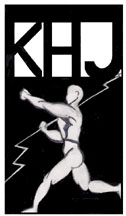This is the KHJ History section of
The Broadcast Archive
Maintained by: Barry Mishkind - The Eclectic Engineer
KHJ - Los Angeles, CA
930 kHz - 5 kW, DA-N
On March 15, 2000, history was made, as 930 kHz in Los Angeles regained an
historic three letter call sign: KHJ. Although the FCC had long since stopped
allowing the use of three letter calls, except for those in continuous use, KHJ
was able to regain a part of its history that had been lost since the 1980s.
Chief Engineer Jerry Lewine was the driving force in accomplishing this, but we
get ahead of our story.
KHJ began operation on April 13, 1922.
Some said its call sign signified "Kindness, Happiness, and Joy" in broadcasting, but it was simply the next set of calls issued by the Department of Commerce in 1922. KHJ was on several locations between 720 kHz and 760 kHz, until the Federal Radio Commission moved it to 900 kHz in November 1928.
The newspaper sold the station in 1927, and Don Lee, a local Cadillac dealer began to transform the station in several ways, including being a key station in the Don Lee Network, which was essentially a west coast segment of the CBS Radio Network. Later, in 1936, Lee turned to Mutual, and the Don Lee Mutual Network
In March, 1941, KHJ was moved by the FCC to 930 kHz.
On May 3, 1965, KHJ was the site chosen for the birth of the new format designed by Bill Drake and Gene Chenault. Ron Jacobs was selected as the first Program Director. BOSS RADIO utilized a tight rotation, top drawer talent, and the elimination of almost all non-essential talk. The Johnny Mann Singers' jingles didn't hurt either. Within months, the format spread from coast to coast, and Boss Radio was the king in most markets.
The Real Don Steele, Robert W. Morgan, Charlie Tuna, Johnny Williams and many more famous names made KHJ a station where things happened. The other rock stations in the market played a catch-up game. Even the mighty KRLA was pushed over into several format changes (from underground to oldies) as they tried to battle KHJ.
Unfortunately, as the 1970s ended, owner RKO General (General Tire) was having major problems with the FCC over its business practices. As the 1980s developed, General Tire lost a valuable TV station license in Boston, and was threatened with losing other stations if they did not sell. Worse, by now the vitality of KHJ had been eroded, and eclipsed by the FM Stereo Rockers with long music "sets" and fewer commercials. KHJ was first turned into a mirror of the FM, KRTH (K-Earth, an oldies station), then was sold in 1989 to Liberman Broadcasting.
Separated from the TV station, which initially kept the KHJ call sign, 930 became KKHJ, and began broadcasting in the Spanish language. However, it was very difficult for them to use KKHJ ... as any Spanish speaker will start to snigger when the double "K"s are pronounced in Spanish (it is an impolite term). As the stations 75th anniversary approached, CE Jerry Lewine approached the FCC and argued that it didn't make sense to force them into an obscenity each hour. Amazingly, the FCC not only bought the argument, but in a nearly unprecedented action, permitted the station to return to its original Three Letter call sign, KHJ.
The memories live on, even in Spanish, at 93 KHJ.